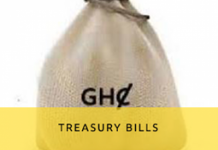Ghana’s total public debt stock has decreased by GH¢24 billion, bringing the total value to GH¢736.9 billion as of November 2024, according to the latest data from the Bank of Ghana.
However, in dollar terms, the debt saw a slight increase from $47.9 billion to $46.8 billion between October and November 2024, mainly due to fluctuations in the local currency.

This decrease represents progress in improving the debt-to-GDP ratio, which now stands at 72.2%, down from 74.6%, a key indicator for fiscal sustainability.
The external debt component declined slightly from GH¢453.7 billion to GH¢425.3 billion, benefiting from improved foreign exchange reserves and restructuring agreements with external creditors.
Conversely, the domestic debt component increased from GH¢307.3 billion to GH¢311.7 billion.
The reduction in the total debt stock reflects the impact of stringent fiscal measures and debt restructuring efforts aimed at ensuring macroeconomic stability.
Additionally, efforts to enhance revenue mobilisation and streamline public expenditure have helped contain domestic debt levels.
Although the current debt-to-GDP ratio shows signs of improvement, analysts caution that achieving long-term sustainability will require consistent fiscal discipline and structural reforms.
The government has reiterated its commitment to reducing the debt burden further through enhanced revenue generation, prudent public spending and economic reforms.
These structural adjustments are expected to align with fiscal policies and economic recovery strategies for sustained growth.
However, industry watchers urge cautious optimism, noting that external factors such as exchange rate volatility and fluctuating commodity prices could pose risks to maintaining the downward trajectory in public debt.
The reduction in debt stock is expected to bolster investor confidence and create a more favorable outlook for Ghana’s economic prospects in the coming months.
























































![[FREE FREE MONEY] Predict and Win a Guaranteed GH¢200 From Us EVERY WEEK](https://wordpress.ghanatalksradio.com/wp-content/uploads/2022/02/Predict-and-Win-Final-09-03-2021-218x150.jpg)
![[Predict & Win – 8th/Oct.] WIN A Guaranteed ¢200 From Us This Week](https://wordpress.ghanatalksradio.com/wp-content/uploads/2021/10/maxresdefault-16-218x150.jpg)
![[Predict & Win – 2nd] WIN A Guaranteed ¢200 From Us This Week](https://wordpress.ghanatalksradio.com/wp-content/uploads/2021/09/maxresdefault-50-218x150.jpg)
![[Predict & Win – 25th] WIN A Guaranteed ¢200 From Us This Week](https://wordpress.ghanatalksradio.com/wp-content/uploads/2021/09/maxresdefault-36-218x150.jpg)
![[Predict & Win – 18th] WIN A Guaranteed ¢200 From Us This Week](https://wordpress.ghanatalksradio.com/wp-content/uploads/2021/09/maxresdefault-23-218x150.jpg)







![[National cathedral] See full list of churches that have contributed since 2018](https://wordpress.ghanatalksradio.com/wp-content/uploads/2020/09/Ghana-National-Cathedral-GhanaTalksRadio-100x70.jpg)



